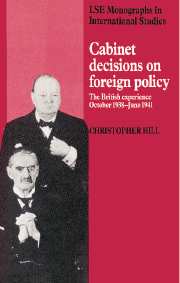Book contents
- Frontmatter
- Contents
- List of figures
- List of tables
- Acknowledgements
- Preface
- 1 Cabinets, foreign policies and case-studies
- 2 Constructing the Polish Guarantee, 15–31 March 1939
- 3 The Soviet question, April–August 1939
- 4 Entry into war, 1–3 September 1939
- 5 Reacting to the ‘peace offensive’, October 1939
- 6 To continue alone? May–July 1940
- 7 The longer term: War Aims and other committees, October 1940–June 1941
- 8 Decision-making in Cabinet
- Appendix 1 The Chamberlain Cabinet, 31 October 1938–3 September 1939
- Appendix 2 Attendance at the Foreign Policy Committee of the Cabinet, 14 November 1938–25 August 1939
- Appendix 3 Neville Chamberlain's statement in the House of Commons, 12 October 1939
- Appendix 4 Lord Halifax's paper for the War Aims Committee, October 1940
- Appendix 5 Anthony Eden's speech at the Mansion House, 29 May 1941 (extract)
- Notes
- Bibliography
- Index
- LSE MONOGRAPHS IN INTERNATIONAL STUDIES
Appendix 5 - Anthony Eden's speech at the Mansion House, 29 May 1941 (extract)
Published online by Cambridge University Press: 02 February 2010
- Frontmatter
- Contents
- List of figures
- List of tables
- Acknowledgements
- Preface
- 1 Cabinets, foreign policies and case-studies
- 2 Constructing the Polish Guarantee, 15–31 March 1939
- 3 The Soviet question, April–August 1939
- 4 Entry into war, 1–3 September 1939
- 5 Reacting to the ‘peace offensive’, October 1939
- 6 To continue alone? May–July 1940
- 7 The longer term: War Aims and other committees, October 1940–June 1941
- 8 Decision-making in Cabinet
- Appendix 1 The Chamberlain Cabinet, 31 October 1938–3 September 1939
- Appendix 2 Attendance at the Foreign Policy Committee of the Cabinet, 14 November 1938–25 August 1939
- Appendix 3 Neville Chamberlain's statement in the House of Commons, 12 October 1939
- Appendix 4 Lord Halifax's paper for the War Aims Committee, October 1940
- Appendix 5 Anthony Eden's speech at the Mansion House, 29 May 1941 (extract)
- Notes
- Bibliography
- Index
- LSE MONOGRAPHS IN INTERNATIONAL STUDIES
Summary
… So it is that Nazism seeks to pretend to itself that there might be some permanence in the thraldom it imposes. And so it is that Hitler has found it necessary to give some decent covering to the naked policy of terror and robbery on which he has embarked in Europe. He has for this purpose invented what he calls the ‘New Order’. Hitler pretends that this New Order is to bring prosperity and happiness to those countries which had been robbed by him of their liberty and their means of livelihood.
But what is the reality behind Hitler's high-sounding announcement? It is not easy to find much which is definite in Germany's New Economic Order, except the plan by which the more important industries are to be mainly concentrated within Germany herself.
Meanwhile, the satellite and tributary nations are to be compelled to confine themselves to agriculture and to other kinds of production which suit German convenience. Currency devices will fix the terms of exchange between Germany's industrial products and the output of the other States, so as to maintain a standard of life in Germany much above that of her neighbours. Meanwhile, all foreign commerce would become a German monopoly. As part of the New Order citizens of tributary states will doubtless be forbidden to learn engineering or any other modern industrial arts. The permanent destruction of all local universities and technical schools will inevitably follow. In this way intellectual darkness must aggravate low physical standards, and the national revivals which Hitler fears so much would be indefinitely postponed.
- Type
- Chapter
- Information
- Cabinet Decisions on Foreign PolicyThe British Experience, October 1938–June 1941, pp. 258 - 262Publisher: Cambridge University PressPrint publication year: 1991



